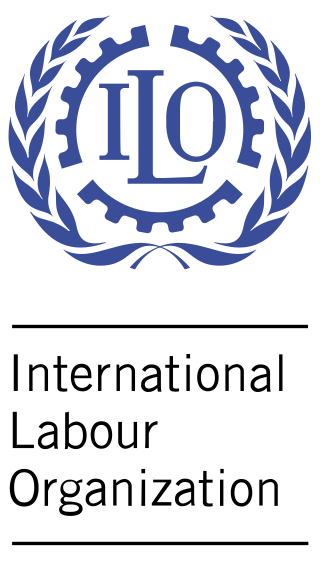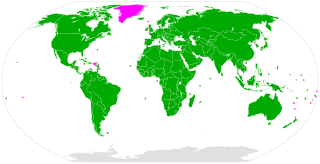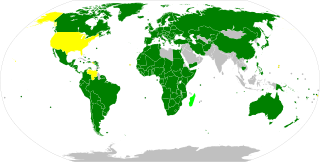
The International Labour Organization (ILO) is a United Nations agency whose mandate is to advance social and economic justice by setting international labour standards. Founded in October 1919 under the League of Nations, it is one of the first and oldest specialised agencies of the UN. The ILO has 187 member states: 186 out of 193 UN member states plus the Cook Islands. It is headquartered in Geneva, Switzerland, with around 40 field offices around the world, and employs some 3,381 staff across 107 nations, of whom 1,698 work in technical cooperation programmes and projects.
Labour laws are those that mediate the relationship between workers, employing entities, trade unions, and the government. Collective labour law relates to the tripartite relationship between employee, employer, and union.
Labor rights or workers' rights are both legal rights and human rights relating to labor relations between workers and employers. These rights are codified in national and international labor and employment law. In general, these rights influence working conditions in the relations of employment. One of the most prominent is the right to freedom of association, otherwise known as the right to organize. Workers organized in trade unions exercise the right to collective bargaining to improve working conditions.

The Convention Concerning the Prohibition and Immediate Action for the Elimination of the Worst Forms of Child Labour, known in short as the Worst Forms of Child Labour Convention, was adopted by the International Labour Organization (ILO) in 1999 as ILO Convention No 182. It is one of eight ILO fundamental conventions.
The Protocol to Prevent, Suppress and Punish Trafficking in Persons, Especially Women and Children is a protocol to the United Nations Convention Against Transnational Organized Crime. It is one of the three Palermo protocols, the others being the Protocol Against the Smuggling of Migrants by Land, Sea and Air and the Protocol Against the Illicit Manufacturing of and Trafficking in Firearms.

The Convention Relating to the Status of Refugees, also known as the 1951 Refugee Convention or the Geneva Convention of 28 July 1951, is a United Nations multilateral treaty that defines who a refugee is and sets out the rights of individuals who are granted asylum and the responsibilities of nations that grant asylum. The Convention also sets out which people do not qualify as refugees, such as war criminals. The Convention also provides for some visa-free travel for holders of refugee travel documents issued under the convention.
Minimum Wage-Fixing Machinery Convention, 1928 is an International Labour Organization Convention.
Holidays with Pay Convention (Revised), 1970 is an International Labour Organization Convention.
Safety Provisions (Building) Convention, 1937 is an International Labour Organization Convention.
Minimum Wage Fixing Machinery (Agriculture) Convention, 1951 is an International Labour Organization Convention.

Indigenous and Tribal Populations Convention, 1957 is an International Labour Organization Convention within the United Nations that was established in 1957. Its primary focus is to recognize and protect the cultural, religious, civil and social rights of indigenous and tribal populations within an independent country, and to provide a standard framework for addressing the economic issues that many of these groups face.
Home Work Convention, created in 1996, is an International Labour Organization (ILO) Convention, which came into force in 2000. It offers protection to workers who are employed in their own homes.
Minimum wage law is the body of law which prohibits employers from hiring employees or workers for less than a given hourly, daily or monthly minimum wage. More than 90% of all countries have some kind of minimum wage legislation.
A maximum wage, also often called a wage ceiling, is a legal limit on how much income an individual can earn. It is a prescribed limitation which can be used to effect change in an economic structure, but its effects are unrelated to those of minimum wage laws used currently by some states to enforce minimum earnings.

The Maritime Labour Convention (MLC) is an International Labour Organization (ILO) convention, number 186, established in 2006 as the fourth pillar of international maritime law and embodies "all up-to-date standards of existing international maritime labour Conventions and Recommendations, as well as the fundamental principles to be found in other international labour Conventions". The other pillars are the SOLAS, STCW and MARPOL. The treaties applies to all ships entering the harbours of parties to the treaty (port states), as well as to all ships flying the flag of state party (flag states, as of 2021: over 91 per cent).

Fiji is an island nation in Melanesia in the South Pacific Ocean with a population of approximately 849,000. It is made up of Fijians, Indo-Fijians, Europeans, Chinese, other Pacific islanders, and people of mixed racial descent. Fiji has been in a state of political unrest since their independence from Britain in 1970.
International labour law is the body of rules spanning public and private international law which concern the rights and duties of employees, employers, trade unions and governments in regulating Work and the workplace. The International Labour Organization and the World Trade Organization have been the main international bodies involved in reforming labour markets. The International Monetary Fund and the World Bank have indirectly driven changes in labour policy by demanding structural adjustment conditions for receiving loans or grants. Issues regarding Conflict of laws arise, determined by national courts, when people work in more than one country, and supra-national bodies, particularly in the law of the European Union, has a growing body of rules regarding labour rights.

The Minimum Wages Act 1948 is an Act of Parliament concerning Indian labour law that sets the minimum wages that must be paid to skilled and unskilled labours.
The Isle of Man is a Crown Dependency located in the Irish Sea between the islands of Great Britain and Ireland with a population in 2015 estimated to be approximately 88,000. It enjoys a high degree of domestic, legislative and political autonomy through its ancient Parliament Tynwald. By convention, the United Kingdom Government is responsible for the conduct of the international relations and defence of the island. The Isle of Man does not have a written constitution, or a Bill of Rights which sets out its Human Rights. These rights are addressed in the Human Rights Act 2001. The island has also ratified a number of international treaties.
Protection of children’s rights is guaranteed by the Constitution of the Republic of Azerbaijan and a number of other laws. Children’s rights embrace legal, social and other issues concerning children.






